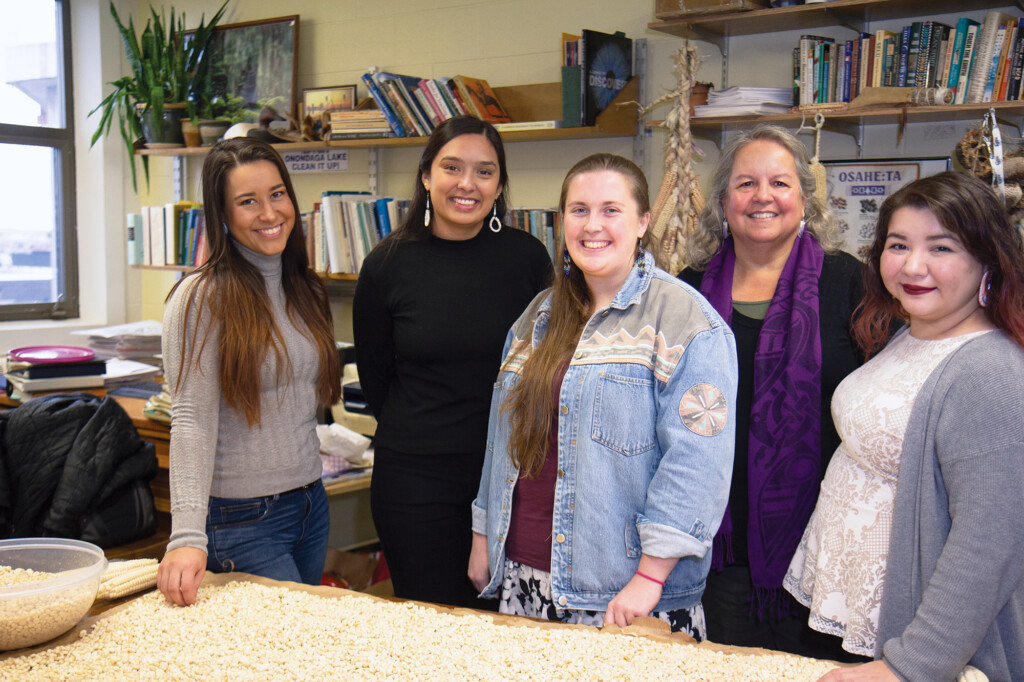Mariah Gladstone grew up near Glacier National Park in Montana’s Rocky Mountains. After earning a bachelor’s degree in environmental engineering from Columbia University, she returned home, near her father’s community, the Blackfeet Nation. Inspired by family roots — her mother is Cherokee from Oklahoma — she created Indigikitchen, an online cooking show that teaches cooking with native food.
“Native people have been subject to very intentional colonization of our diets. The past 200 years has brought rapid forced dietary shifts that have led to disease and destruction of plants,” said Gladstone, an ESF student in the Alfred P. Sloan Foundation’s Indigenous Graduate Partnership (SIGP).
At ESF, Gladstone will research how the Blackfeet’s harvesting practices have aided regeneration of prairie turnips, a root vegetable that grows in high plains areas. “Prairie turnips are central to Blackfeet as food, and their harvesting practices are important to that species and its proliferation on the plains,” she said.
Gladstone is one of four ESF master’s students who received SIGP funding this fall. Also supported through the Sloan partnership is Susannah Howard of the Citizen Potawatomi Nation, who earned a bachelor’s degree in environmental geosciences and certificate in Native American and Indigenous studies from Smith College. The third student is Dineh Judd, of the Navajo Nation and graduate of Northwest
Indian College, who is in the graduate program in environmental science, studying rare plants on the Navajo Nation. Biidaabin Reinhardt, Ojibwe from northern Michigan, is earning her M.S. in sustainable construction, evaluating birch bark as an element of green building. A fifth Sloan scholar doctoral student Avery OldCoyote, from the Crow Nation, began studying at ESF this semester.
ESF is one of eight universities that have become SIGP participants, including Purdue University, Arizona State University and the University of Alaska at both Anchorage and Fairbanks, since 2013.
The SIGP funding was secured through the efforts of the ESF Office of Development, with the participation of Distinguished Teaching
Professor Robin Kimmerer, an enrolled member of the Citizen Potawatomi Nation and founding director of ESF’s Center for Native Peoples and the Environment (CNPE).
Leah Tuck, major gifts officer in the Office of Development, said partnering with the prestigious Sloan program not only helps ESF meet its graduate student enrollment goals, but also addresses the College’s goal of increasing diversity, inclusion and equity among the student body. In addition, she said, it reflects the success of Kimmerer’s work to meld scientific knowledge with Traditional Ecological Knowledge.
“This support is a testament to the work Dr. Kimmerer has been doing for more than a decade with the CNPE,” Tuck said. “It’s a clear indication that the work is significant to Native students and to environmental leaders in the fields of science, technology, engineering and math (STEM).”
ESF sought students in STEM disciplines, “who wanted to integrate their cultural knowledge and use their degrees to support cultural revitalization in their native communities,” Kimmerer said. Multiple cohorts “create a critical mass to interact and share ideas,” she said. “It magnifies their research and increases peer mentoring.”
The fellows’ diversity provides multiple perspectives and underscores that there is not one universal Native American experience. “They come from different reservations with different experiences, different ecosystems, different cultures,” Kimmerer said.
The program serves Native students, but, “it can transform the institution as well,” by bringing indigenous science perspectives into the ESF community, Kimmerer added. “This is also an opportunity for non-native students to become good allies and to affect their own thinking.”
“My community has already experienced climate change in a rapid way, having been moved in the 1850s from the Great Lakes to Kansas by Federal Indian Removal policy,” Howard said.
Collaborating with Sloan’s other university partners also multiplies opportunities for learning. “We get their insight and can share in their best practices,” she said. “It helps ESF learn and they get to learn from us.” Kimmerer counts herself among the beneficiaries. “It is a source of colleagues for me,” she said. “I appreciate the collaboration.
“One of the hallmarks of indigenous thinking is it is holistic and integrated,” Kimmerer said. “It doesn’t compartmentalize science from policy. Those things are integrated one with another in a cultural context.”
Educated indigenous scientists could, for example, play important roles in the honoring
of treaty rights, and guiding land use and conservation. “We have the opportunity to help educate a whole new generation of indigenous land managers,” Kimmerer said. “They will contribute to the growing wave of self-determination in indigenous environmental decision making.”
Howard is studying how climate change affects culturally important plants of the Potawatomi. She grew up in Vermont and first visited Oklahoma for a six-week Potawatomi leadership program. “It was a crash course on the culture and business and how we exist as a nation and build relationships so you can give back,” she said.
“My community has already experienced climate change in a rapid way, having been moved in the 1850s from the Great Lakes to Kansas by Federal Indian Removal policy,” she said. “In the face of removal from our homelands, how did we adapt ? There might be lessons for us now in adapting to climate change.”
She expects to pursue a doctorate in environmental science. “A lot of what drives me is knowing the more time I spend in academia, the easier it will be for the next generation,” she said.
For Gladstone, cooking with indigenous foods strengthens the ties to her culture.
“I’m lucky to come from such different communities,” she said. “Working with food merges the farming tradition with the hunter-gatherer tradition and shows their relevance on landscapes even as those landscapes have shifted over time. It’s a reminder that traditional knowledge transcends our physical location.”
Renée K. Gadoua is a freelance writer and editor in the Syracuse area.



